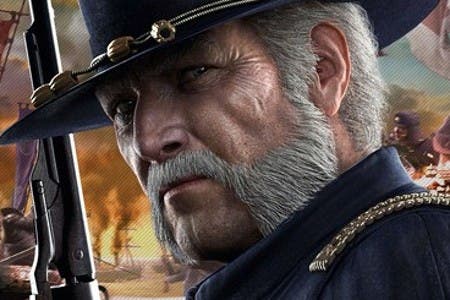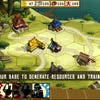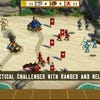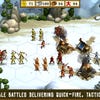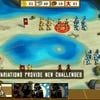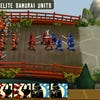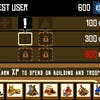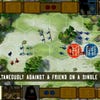Inside The Creative Assembly
As the studio celebrates 25 years in business and another BAFTA, it speaks about its successes and its future.
Winning a BAFTA and shipping a massive expansion, celebrating a quarter of a century in the industry and managing to be one of the few outfits expanding against an increasingly bleak economic backdrop - that's not bad work, all in all, but the team at The Creative Assembly aren't exactly ones to shout about their success.
Over 25 years, the studio that's situated in peaceful, unassuming Horsham has quietly earned a reputation for excellence, built largely around its long-running Total War series. The BAFTA, won in this year's best strategy category, is the third that the series has been awarded to date.
"This year we were up against Deus Ex," Mike Simpson, Total War's studio director tells us, "and the original Shogun in 2000 was up against the original Deus Ex - which they then won. We were so upset having lost that time round when we got nominated the following year we didn't go - and we won that one."
What exactly Deus Ex: Human Revolution was doing in the strategy category is an issue for another time; for The Creative Assembly it was gentle revenge, and another trophy for its swelling cabinet. "They're definitely the best ones to have," says Simpson. "They weigh more than all the other awards put together. If you're ever going to get caught in a dark alley with a trophy in your hand, you'd hope it'd be a BAFTA."
There was a time before Total War, though, and a time when The Creative Assembly was a very different outfit - it started off life working on ports of Psygnosis games in the late 80s, and then went on to partner with EA as it produced a series of sport brands. It was during this period that Mike Simpson joined, rekindling a relationship he'd with founder Tim Ansell from his time at Psygnosis.
"If you're ever going to get caught in a dark alley with a trophy in your hand, you'd hope it'd be a BAFTA."
"I joined to start another team to do something different," Simpson recalls. "The original idea was to do an RPG and have it based on Monkey. We were going to do it in Singapore, because the Singapore government funded us setting up a studio there. But somehow we ended up doing Shogun instead."
"Like all these things, you end up with a series of accidents. We looked into the Singapore thing, and all of the grants that were offered had various things attached, and like most things that sound too good to be true, it probably was.
"But it was just a sequence of events that led to Shogun. Command and Conquer came out, and then a whole bunch of Command and Conquer clones came out - things like Kill, Crush & Destroy - and sold remarkably well. We looked at that, and thought we could make this really complex, ground-breaking RPG or we could just knock off a quick Command and Conquer clone - and that'd be much easier."
It would become much, much more than that, of course. The first Shogun's development happened in tandem with a sharp technological evolution that saw the introduction of 3D graphics - and one that suggested to The Creative Assembly that it could hijack this new technology to breathe a little originality into its Command and Conquer clone.
"It opened up the possibility of doing a battlefield in 3D," recalls Simpson. "We had this idea that maybe you could build a battlefield with curved hills - and no-one had ever done curves before - and put the camera through the eyes of the general. And it snowballed from that. It started off being a sort of B-grade Command and Conquer clone to being its very own thing."
Six games have followed since, each maintaining and building upon the series' reputation for excellence. It's been a steadfastly PC series to date, though, and new platforms present new challenges for the Total War team.
The first of which is Total War Battles, an iOS game that's coming out later in April. "It's actually really interesting, says Simpson. "We started off wanting to do something on other platforms, and iPhone and iPad in particular were interesting. But if you look at Total War and look at those platforms, you think you can't do that, you can't do the same thing on there. It's not like you can just port the game on to a screen that size - it won't work.
"So we basically had to reinvent the whole thing, and come at it from a different direction. We looked at the platform and thought, what can the platform bring, what can it do really well - and then take some of the colours of Total War - things like the real-time battles, and some element of deeper strategy behind that - and immersing it in some kind of historical context. We rolled that up with the platform to come up with something new and different, and that's what we've done.
"It's a different thing - it's the kind of thing you'd play when you'd normally play an iPhone game. It's not a heavyweight Total War experience."
It's a smart extension of the brand, and it's one that takes advantage of the silent growth of the strategy genre. "Facebook gaming in particular has trained hundred of millions of people to play strategy games," Simpson observes. "They're not very complicated strategy games yet, but you can see how my 75 year-old aunt progress through games of increasing complexity. It's really becoming mass market in a way that games never have been before."
"The current generation of consoles just can't cope - they don't have enough memory, by a large factor. Those technical reasons are probably the only reasons. A lot of people think that UI's a problem, because no one's really done it well before. I don't think that's a fundamental thing - I just think it's simply that no one's really done it very well before."
When talk comes to other platforms, it's hard not to let the mind wander, and to ask whether Total War could ever make the leap to console. It's certainly something that Creative Assembly has considered, even if it doesn't have any definitive answers just yet.
"We've probably always talked about this. I've always said that there's no fundamental reason why that kind of game couldn't work, but there are various problems that have to be overcome. You can't just take Total War on PC and then port it over to console.
"The current generation of consoles just can't cope - they don't have enough memory, by a large factor. Those technical reasons are probably the only reasons. A lot of people think that UI's a problem, because no one's really done it well before. I don't think that's a fundamental thing - I just think it's simply that no one's really done it very well before. A lot of the games have been ports of PC games without too much thought having gone into it.
"It's not a huge genre on console right now, though. But I think that's likely to change, for all sorts of reasons. The next generation of consoles, whenever they appear, will be more powerful than the current generation."
If Total War on console is to happen, then it seems it'll be a case of waiting a couple of years for the next generation to arrive - although The Creative Assembly's also aware that it's not just raw power that's a barrier to the series making the leap to consoles.
"The way people play on console is different to the way that you play on PC," Simpson acknowledges. "You don't sit down for four or five hours at a time, generally. It's much smaller play sessions, but we do have some very clever ideas in the pipeline for things we could do to make that happen. That applies not just to console, though - that's more about broadening the appeal of the game in general."
Console development is an area that The Creative Assembly has worked in before, to varying degrees of success - there was the impressive Spartan: Total Warrior in 2005, and the less than impressive Viking: Battle for Asgard back in 2008. There's another console title in development, of course - the mysterious Aliens project that's yet to be properly revealed. What lessons has The Creative Assembly taken on board from its weaker console outing?
"I think the main thing is that you have to give your game enough time," reflects Simpson. "You have to basically give it the time it needs to get to a state where is it's as good as it can be. I don't think we did that with Viking - we probably released that around six months too early. There were all sorts of reasons for that at the time."
Information on the Aliens game remains thin on the ground, though it's heartening to know that The Creative Assembly has learnt from its mistakes. It's also pleasing to know that the game - being developed by a separate development team to that which deals with Total War, but that's in the same building - is benefitting from a hearty recruitment drive.
There are so many options and I don't think we're going to run out of ideas. I think it'll be a long time until we do anything with a three in it."
There are ex-Ubisoft and ex-Crytek staff, among countless others. "For the console team, from a technological point of view, they're the bleeding edge," boasts Simpson. "They are very, very good and they're doing some very clever things."
We'll have to wait until later in the year to see exactly what those things are, and right now Simpson and his Total War team are busy enough taking stock of another big launch, and looking ahead to the future of the series.
"We've basically got a list of pretty much everything that anyone could imagine on it," he says of plans for forthcoming Total War games. "We have constant arguments about not what we should do but the order in which we should do them. There are so many options and I don't think we're going to run out of ideas. I think it'll be a long time until we do anything with a three in it."
The Creative Assembly's been a remarkably resilient outfit, always growing as other companies shrink and disappear into oblivion (the secret to the success, Simpson reveals is simple - "Just keep making great games, I guess"). And where will it be in another 25 years time?
"Hmm," pauses Simpson, his mind quickly moving into gear. "I was working out how long it'll take until we all get a BAFTA each. It could take a little longer than 25 years, though. "
